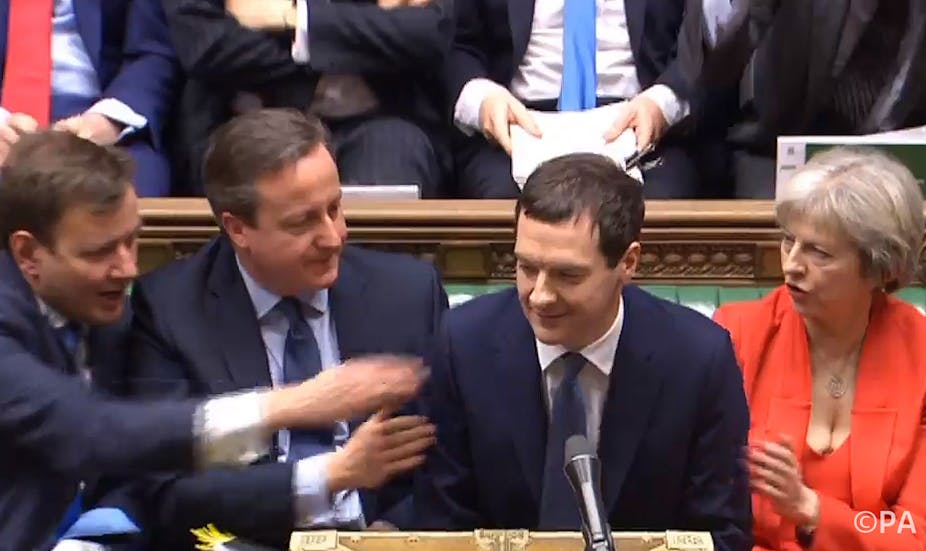Every budget is framed by political considerations, but they are particularly important in this one. Normally, a budget in the first year of a five-year parliament would be the time to announce tough but necessary measures. These considerations, however, are dwarfed by the massively important referendum on the UK’s membership of the EU.
If the decision is to remain, then George Osborne’s future should be relatively bright, and he will be a strong candidate to succeed David Cameron. But a leave verdict would be a detriment to his leadership prospects. The Brexit vote will to some extent be a vote of the public’s confidence in the government.
So the chancellor’s strategy in this budget has been to avoid doing anything that will antagonise anybody, attempting to create an impression of quietly assured competence – that the government’s economic policy is succeeding – but also that we need to give them more time to realise the fruits of their policies. Osborne played up the threats of the external environment and sluggish global growth in particular – so he can blame them when the economy is under-performing, all the while assuring us that we need to stick to the course he has outlined.
Economic growth
It is true both that the UK economy is performing reasonably well, but that the chancellor is failing to meet some of his targets, particularly for deficit reduction. The UK’s rate of economic growth is expected to be 2% or slightly higher over the next few years, which compares favourably with other advanced economies. The rate of inflation is extremely low, employment is at a record high, and living standards are rising, albeit slowly.
Nevertheless, there are threats, partly from the world economy, but also uncertainty about the outcome of the EU referendum, which might be expected to reduce business spending. And the UK’s low level of productivity growth seems likely to persist. At the international level, Chinese economic growth is falling, growth in the eurozone is minimal, there are major uncertainties about the US, and some other important economies, such as Brazil and Russia, are contracting. But the chancellor’s reaction is not to attempt to stimulate economic growth through fiscal expansion. Instead, he seems to use it as a reason to persist with his longer-term plans.
The budget does contain a number of measures to enhance long-term growth. He is increasing infrastructure expenditure and there is reform of education spending. On the tax side, there are reductions in business rates and corporation tax.
Although his plans to balance the budget have slipped, Osborne still projects a budget surplus of £10.4 billion by 2019-20. This involves quite a large change from the OBR’s projected deficit of £21.4 billion in 2018-19. How that will be achieved in what promises to be an election year is not at all clear. It seems to be a case of delaying the pain. But in any case it seems clear that government debt will be falling as a percentage of GDP henceforth, so the deficit problem has been largely solved.
Bland budget
There is nothing in the budget that should prove massively controversial (although there is much that seems complicated); pension reform has been shelved. There are a number of measures that should prove popular with large swathes of the electorate, such as a number of measures to tackle tax avoidance and evasion and the (unexpected) introduction of a tax on sugar in fizzy drinks.
It is difficult to see how these measures will contribute to enhancing growth in the near future, except perhaps by their effects on confidence. So the economy remains vulnerable in the short term. It is not clear what will happen if there is a vote for Brexit – and the chancellor emphasised that the OBR forecasts he was quoting were contingent on the UK remaining in the EU.
As far as longer term growth is concerned, the effects of increased infrastructure and education spending on growth and productivity might take well over a decade (or two) to be realised. It is difficult to see that the budget will do much for growth over the more medium term (the next five years). But that was not its main point.
We will have to wait at least until after the referendum on June 23 to assess whether the budget was a success in meeting Osborne’s prime political objective. As far as measures that might affect growth in the more medium term are concerned, we will have to wait, perhaps until the autumn, when we can expect a rather different set of measures in the chancellor’s next financial statement, some of which may be painful.

